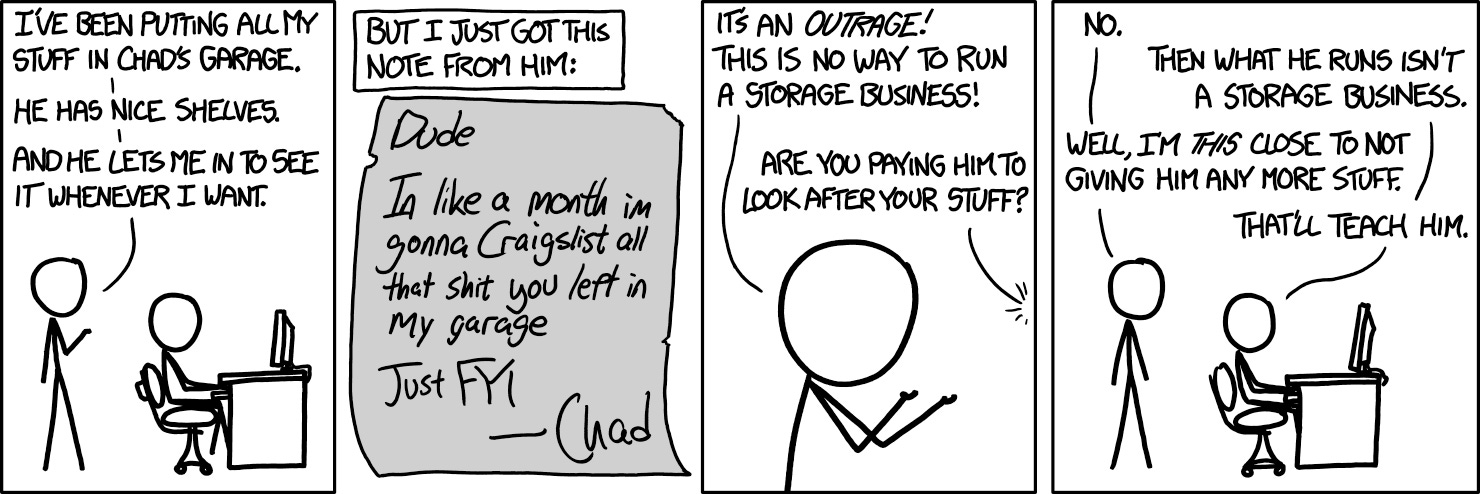The Instagram gods are angry
Reconsidering our relationship to the almighty photo-sharing app
Has this happened to you?
My coffee had barely kicked in when I got a notification on my phone explaining that my Instagram account was on the verge of deletion because of a picture I had shared in my Stories. My heart raced as I swiped through the screens, informing me I had violated the “Community Guidelines.” Social media should not strike this kind of fear in my heart — especially at six o’clock in the morning.
What will I do if they delete my account?
Of course, this is why I’m focusing more of my time on this newsletter — I want to show photography, promote artists, and engage with folks who dig what I do without fearing I may lose access to each of you. I don’t think that’s too much to ask.
This isn’t the first time Instagram has scolded me for my bad curatorial choices. In February, I showed an image from Matthew Morocco’s Complicit series — the photo you see at the top of this post. That picture was “removed for adult sexual solicitation.” For those unfamiliar with Matthew’s work, Eren Orbey wrote an excellent piece about Complicit in The New Yorker in 2018. She explains:
“Complicit” presents an ethnography of men who have matured past their physical prime, perhaps, but not beyond erotic interest. Morrocco’s models sometimes appear as bashful fragments, their limp forms sunk in a sofa or snarled around a tree. More often they flaunt their undress: one strikes a come-hither pose, and another snubs the camera, as though to test its dedication. The photographer himself emerges as a spectral presence in the series, invading the frame, on occasion, to heed his subjects’ desires. He fondles the jaw of one, paws the buttocks of another. In the collection, he writes of learning from these men how to seduce, to age gracefully, to seize the past: “The education I received outweighed anything I had experienced before.”
Okay, fair enough. These images may be charged with erotic energy, but are they pornographic? Matthew’s portraiture is moving, but “sexual solicitation” is a stretch. I appreciate the enormity of the challenge from Instagram’s perspective — How do you separate the good actors from the bad ones? And how do you police pornography while allowing for artistic expression? I’ll give them the benefit of the doubt. I just don’t want them to delete my account (and my 50k followers) in the process.
As I was writing this, I remembered that I’d run afoul of Meta’s strict visual guidelines one other time previously. A few years ago, I posted Wynn Bullock’s “Child in Forest” in the FlakPhoto Network, the photo discussion group I host on Facebook. The image elicited lots of thoughtful responses from our community members — most people who know photography agree it’s a classic work of art.
Barbara Bullock-Wilson, Bullock's daughter and the subject of the photo, provides some insight into Bullock's reasons for making it:
For Dad, the image was one of interesting contrasts – an ancient virginal forest and a young virginal child. These contrasts manifested the dynamic, cyclic character of natural forces. As he once described the making of it, he felt the light was just right, everything was spatially balanced and the relationships between events – the young child, the fresh forest covering, the prehistoric trees, the rotting logs – were all strong and exciting. Dad would encourage questioners to set aside any fears or preconceptions they might have. He would invite them to look at the photograph again. "Be with the child, feel her presence, see the leaves adorning her hair. Put yourself in the forest, watch the light, sense the life." He would go on to say, "There may be mystery here, but it isn't sinister. It's the mystery of difference and of oneness, of universal forces and relationships, of dimensions we can only begin to glimpse."
That's beautiful — the human animal in her natural habitat. A pure soul in the Garden of Eden. Naturally, Facebook pulled the picture from the group after a few hours. I received a similar notification explaining that I'd violated the terms of Facebook's community guidelines and that our 19k-member group was at risk of being deleted. Fortunately, that didn't happen. But it did stir a resentment in me toward these platforms. I remember that day well because I realized then that my honeymoon with social media was officially over. I knew I would eventually need to log off these social nets if I wanted complete creative control to show the artists and images that moved me. It's obvious stuff, but it still took me years to reboot this newsletter.
I’m not the first person to have this problem. But this episode was another reminder of how little power we users have in the social media universe — each of us a helpless cog in the commercial wheel. Last Year, Valentina Di Liscia wrote a piece in Hyperallergic about how Instagram’s “sensitive content controls” impacted artists on the platform. This quote, from print and zine maker Heather Benjamin, was particularly chilling:
“Since this has already happened to me so many times, I’m constantly on edge about posting my work,” Benjamin told Hyperallergic. “But as an independent, unrepresented artist, I rely on Instagram as my main method of disseminating my work and as my only source of income since it’s how I make independent sales. For my Instagram to be permanently deleted would significantly change the course of my career, if not literally end it.”
In 2019, Joerg Colberg published a lengthy post about Instagram censorship that included the voices of various artists who had found their accounts flagged for violations and, in some cases, deleted. I revisited it in the wake of my own experience, and the sentiment that resonated most deeply was Joerg’s open question:
if you want to show your work on the most popular social media platform that is exclusively tied to photography but you can’t because it falls foul of some “community guidelines” (that, to be honest, aren’t that clear to me) then what does this mean for you? Do you self-censor your work to show simulations of the work? Do you change your work? If your work centers on very meaningful intimate aspects of your life what does IG’s censorship do to you?
On reflection, all of these violations testify to the conservative values governing these algorithmically-policed ecosystems. Child nudity warnings are critical, but many of these decisions are highly problematic, especially given the wildly sexualized female imagery I see on Twitter, TikTok, and Instagram. I remember seeing this video with Jannica Honey on the BBC a few years ago. Her thoughts about social media depictions of female nudity and the male gaze are spot on:
In addition to these censorship concerns, Instagram continues to tweak its algorithms and change its stripes as it adapts to compete with TikTok, the popular Chinese video-sharing app. How these changes will impact artists and photographers remains to be seen. Earlier this month, tech columnist Kalley Huang published a piece in The New York Times that portends a dire future for artists and imagemakers:
For artists who make a living through Instagram, the platform’s move toward video is more of an existential threat. Many of these artists are photographers, illustrators, or graphic novelists whose work doesn’t easily translate to video. More and more, they are finding that audiences on Instagram aren’t seeing their posts, their growth on the platform is stagnating and their reach is shrinking.

Every artist I know hates what Instagram has become. Yet, we all still use it. One of my IG friends called it “an unhappy marriage of convenience.” I’ve begun to wonder if my relationship with Instagram is closer to Stockholm Syndrome than genuine affection. It’s not a healthy dynamic, yet most of us are staying put.
My buddy Marcus and I sometimes joke about Randall Munroe’s “Chad’s garage” comic. He’s right: I’m storing my stuff on Instagram’s turf, which means I have to play by their rules. We all do. I’m not outraged about these Community Guidelines. And I don’t expect artists to leave Instagram. I don’t want to leave Instagram! But it’s time to seriously consider our fates if we continue to pour our creative energies into these platforms without staking alternative claims elsewhere online.
Don’t get me wrong; I would seriously miss Instagram if they deleted my account. I love my community there, and I don’t think I would have the energy to start over if they bounced me from the app. But policies like this don’t bode well for artists or curators. I’ll be treading lightly with IG from now on. Wish me luck. 📸
I know many of you have similar stories. I would love to hear them and anything else you think about this situation. I’m looking forward to hearing from you!
I don't want to rely on Instagram. If you would be so kind as to tell your friends about this newsletter, I would sincerely appreciate it. Please share this link today. Thank you!
PS: For those of you still fighting the good fight on Instagram despite these many setbacks, you’ll appreciate Anastasia Campos’ Ode to Instagram. Godspeed!








Andy, Instagram is really about making money for the owners through advertising revenue. Once you grasp that it will make more sense. A photo of naked older men embracing might be great/interesting art but is it something they can hang an ad off of? Maybe not. Instagram's ideal posted photograph is one that appeals to the most people (the core advertising audience). Think about puffy clouds, animal photos, white picket fences, green forests, country scenes, waterfalls, heterosexual couples, fast cars, food, sunsets, cruise ships.....ok ok you get the idea.
iG has come and gone for photographers. In fact it left a long time ago. And in truth, was it ever really meant for photographers? I think we tried to cling to something that wasn’t really ever ours and as the TOS changed we ignored it until we couldn’t ignore it any longer.
We tend to think of it as a community. And for some who maintain that very small group of friends and family, it could be. Otherwise, it really just helps stroke our egos when we get all of those “likes”. Harsh words but if you want to break free of it then you have to come to that realization first.
Build your own community. Your newsletter is that first step. These are the people who will choose to read and choose to interact. They will take the time to read through and comment. If you were to ask the thousands of people on your IG, “who is Andy Adams?” Most probably wouldn’t know. If you ask on your newsletter, everyone would tell you because they followed with intent.
Another good article Andy!